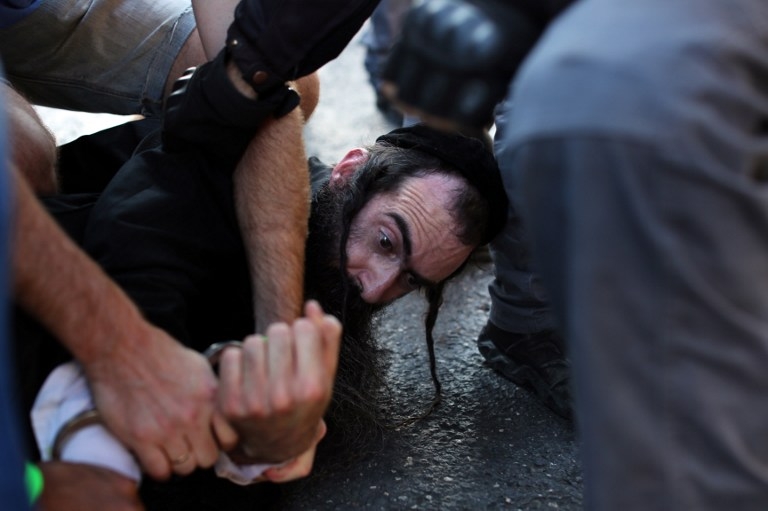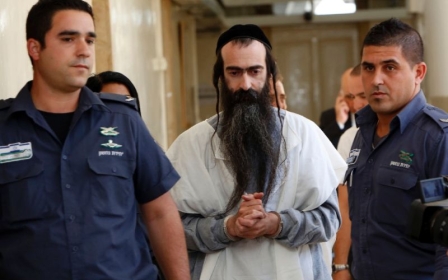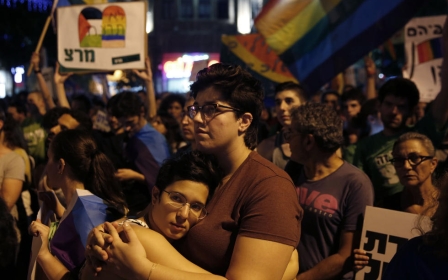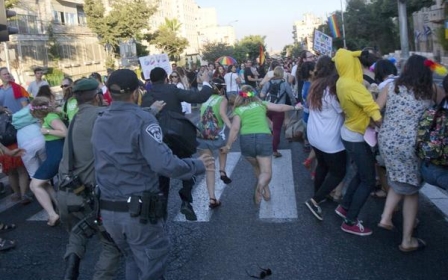Jerusalem Gay Pride killer 'plotted new attack from prison': Police

Israeli police said they had detected a new plot against Jerusalem's Gay Pride march to be held on Thursday, a year after an ultra-Orthodox Jew killed a teenager and stabbed five other people.
Police said they suspected the man behind the attack on last year's march, Yishai Shlissel, had been in contact with his brother from prison about an assault on Thursday's event.
Shlissel's brother, Michael, has been arrested and was being held in police custody.
Police said in a statement they uncovered information that "Yishai Shlissel had planned, with his brother Michael Shlissel, to attack march participants".
The alleged plot raised fresh concerns hours ahead of the march, with hundreds of Israeli police already deploying in Jerusalem to protect participants.
Shira Banki, 16, was killed at the march in July last year after she was attacked at random along with five others by Shlissel, who is now serving a life sentence.
Shlissel had spent 10 years in jail after an almost identical attack on the 2005 Jerusalem Gay Pride march and had been released just three weeks before last year's event, leading to criticism of police.
This year they have promised to increase the number of officers, with up to 2,000 reportedly being deployed.
The route of the parade was closed off to cars in the early afternoon.
All marchers will be inspected before joining, with many pre-registering, while carrying a weapon of any kind will be prohibited, police said.
Entry to and from the march, which begins at 6:00 pm (1500 GMT), will be severely restricted.
Last year, around 5,000 people marched, and organisers expect a higher turnout this year.
The participants will walk past the site where Banki was murdered and her parents will address the crowd at the end of the march.
Tom Canning, one of the organisers who himself narrowly avoided being stabbed last year, said he was satisfied with the security steps taken by police.
"I think the police got a big blow from what happened last year," he told AFP.
"This year the entire security plan has been in planning for the last three months and is being managed by the highest ranks of the police."
The annual Gay Pride parade in Jerusalem is however far smaller than the one held in nearby Tel Aviv, which typically attracts tens of thousands of people.
Jerusalem Mayor Nir Barkat has drawn the ire of many in the gay community for announcing he would not attend Thursday's march in part because it "offends the (ultra-Orthodox Jewish) public and the national-religious public".
The march comes at a difficult time for Israel's LGBT (lesbian, gay, bisexual and transgender) community, with an alleged homophobe recently nominated as the army's chief rabbi.
The military named Colonel Eyal Karim as its chief rabbi despite him having allegedly referred to gay people as "sick and disabled".
There was also an outcry over his response to a question on the rape of non-Jewish women in wartime. Some interpreted Karim's response as justifying it, which he firmly denied.
A gay pride march in the southern city of Beersheba was also cancelled by organisers last week after the high court agreed with police that it could not go through the city's main thoroughfare due to security threats.
Imri Kalmann, co-chair of Aguda - the Israeli National LGBT Task Force - said it was clear that "words had consequences".
"When the head officer of the army decided to put aside everything that the army rabbi said and to give him the position as chief rabbi, he said something not only to him but to everyone," he told AFP.
"He said: 'You can say bad things about women, about the (gay) community and it won’t really harm you.'"
Middle East Eye propose une couverture et une analyse indépendantes et incomparables du Moyen-Orient, de l’Afrique du Nord et d’autres régions du monde. Pour en savoir plus sur la reprise de ce contenu et les frais qui s’appliquent, veuillez remplir ce formulaire [en anglais]. Pour en savoir plus sur MEE, cliquez ici [en anglais].




